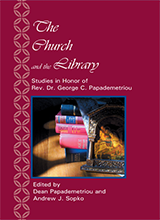Dean Papademetriou and Andrew Sopko, Editors - The Church and the Library, Reviewed by Grace Ji-Sun Kim
(Journal of Ecumenical Studies, Winter, 2008. Grace Ji-Sun Kim teaches at Moravian Theological Seminary, Bethlehem, Pennsylavania.)
This is a wonderful collection of essays that honors George Papademetriou's life and work for the church and the academy, serving as a priest and teaching theology at Hellenic College/Holy Cross School of Theology, where he was also librarian. Papademetriou's interests lie in theology of reconciliation, religious dialogue, and Orthodox theology, and many of the essays included in this book reflect these themes. The volume explores Dervish Mysticism and Orthodox Hesychasm, interreligious dialogue, and dialogue for peace among the three monotheistic religions. An article by Ziakas posits that the common parent of Jews, Christians, and Muslims has been both a cause for celebration and a locus of differences. This shared heritage brings forth similarities, such as faith in the God of revelation, but allows for preservation of distinctive identities through unique ways of viewing the sacred persons of the Bible: Adam, Abraham, Moses, Jesus Christ, and the Virgin Mary (p. 138).
The book contains useful data for lay readers as well as scholars, including current and informative articles that deal with urgent issues such as ecology. Several essays offer helpful resources for churches: hymns for children's ministry, wedding benedictions, insights regarding the expansion of the church. An article by Archbishop Lazar Puhalo tackles the issue of consumerism and its social influence, not only toward excess but also toward self-centeredness and indifference. He argues that Christians who live in a capitalist society must face the moral challenges of its negative side, or future generations will have to pay a terrible price for the excess and overindulgence of our era, for our greed and waste. Finally, Puhalo calls for deeper awareness of environmental issues.
Even though its scholarship is cutting-edge, the book lacks any essays covering the questions of women in the church, in society, or in theology. The volume begins with a Patriarchal and Episcopal blessing, which sets the tone of the book as situated within the patriarchal framework of the Orthodox Church and the academy. Its use of exclusive language is pervasive, as is patriarchal thinking. Certainly, an essay addressing women's role would have enriched the collection and helped fulfill its overall goal--it is, after all, a book about dialogue, acceptance, and embrace.
Still, despite this large gap in scholarship, this work is informative and makes an important contribution to the world harmony and acceptance of the Other--an important theological concern in our multireligious, postcolonial, and global world. The volume will open the reader's eyes to new areas of scholarship and education and can attract those from the church and the academy who place importance on dialogue, reconciliation, and ecumenical acceptance.
COPYRIGHT 2008 Journal of Ecumenical Studies COPYRIGHT 2008 Gale, Cengage Learning

